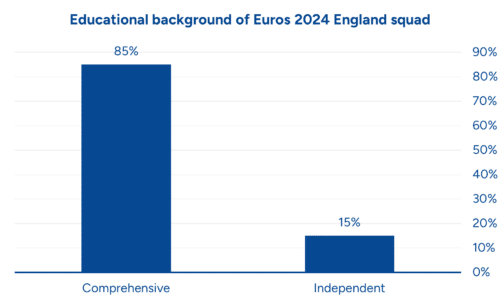News
15% of the 26 England squad members in Germany this summer attended private schools, compared to 7% of the population as a whole. But why should we care about the educational backgrounds of footballers? Surely what matters is not where they went to school but who scores the goals, right?
Well, yes and no. It is actually both. While fans will naturally focus on goals, from a social mobility perspective the educational background of elite sports people reveals how their successes are themselves the result of competition on less even playing fields.
Elite sports offer intriguing insights into what lies behind success in contemporary society. Sutton Trust analysis in 2021 – at the time of England’s previous Euros successes – found that while only 8% of the squad had attended independent schools, this was much lower than the 40% for Team GB’s Olympic medallists in Tokyo the previous year. In 2019 Sutton Trust research found that 43% of the England men’s cricket team went to private schools and 37% of the England men’s rugby team.
Men’s football is actually the exception rather than the rule in elite sport (one we have celebrated in the past) and while the privately educated proportion has increased for the current squad, the vast majority come from modest socio-economic backgrounds. In fact, some of those who went to private schools were sponsored by powerful Premier League teams. Phil Foden and Cole Palmer, for instance, both came through the Manchester City Academy educated at its partner St. Bede’s College in Manchester.
Given the usually superior, even elite international standard, facilities, coaches, training and competitive opportunities that private schools with their more abundant resources are able to provide, it is certainly no coincidence that independent schools are over-represented in elite sport. By contrast, recent teacher polling by the Sutton Trust found that nearly a third (29%) of school leaders managing reduced budgets have had to cut spending on sport and other extracurricular activities over the last year. It’s also probably no coincidence that some of the top Premier League clubs fund their top academy pupils to learn and train at private schools (although Trent Alexander Arnold, who we have counted as comprehensively educated, was moved by Liverpool from a private school to their preferred partner state school).
Football has not been the only thing in the headlines this week of course. At the weekend Sir Keir Starmer – also a football fan – announced the most socio-economically diverse cabinet in history with only 4% having attended private school (note that while the majority of the government has now been appointed, further appointments are still being made, so these proportions may shift slightly), compared to 63% of Rishi Sunak’s last cabinet. It’s therefore tempting to point to how, also for the first time ever, the cabinet has fewer privately educated members than the England squad. However, the contexts of these analyses are quite different.
Previous cabinets with high proportions of privately-educated ministers reflected widespread privilege and inequality in UK society. The state vs privately educated ratio of the England squad, on the contrary, is largely the product of a society in which the sporting acumen of those at the top of their game can help them leapfrog the inequalities of that broader society.
This reminds us that football is an exception. Every pupil should have access to the same high-quality education regardless of background or sporting prowess and making that a reality in the UK must be a priority for the new historically socio-economically diverse Labour cabinet.

